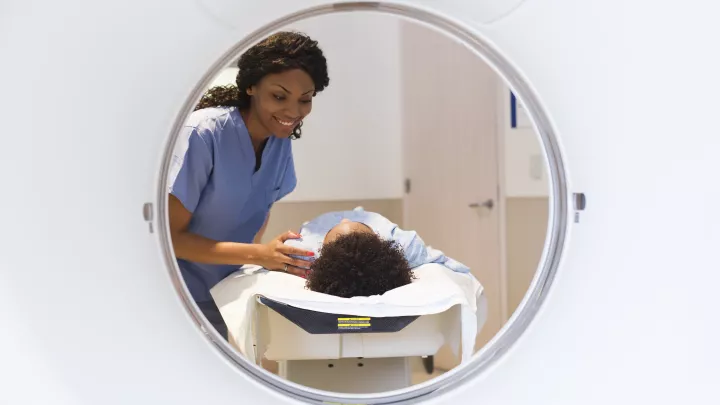Interstitial Lung Disease Program
Interstitial lung disease is a group of more than 30 rare lung disorders that affect a child’s breathing and oxygen levels. Also called diffuse lung disease, this lifelong condition requires advanced care from a team of specialists.
The Interstitial Lung Disease Program at Children’s Hospital Los Angeles is among a select few programs of its kind in the nation. Our compassionate care and comprehensive services improve your child’s breathing so they enjoy a full life.
Pediatric Interstitial Lung Disease Care: Why Choose Us?
Dedicated interstitial lung disease services are a specialized pulmonology offering at CHLA. U.S. News & World Report ranks our pediatric pulmonology and sleep medicine services among the country’s best.
Our Interstitial Lung Disease Program offers:
- Team approach to care: Our program brings together specialists from different medical fields to manage every aspect of your child’s health. Whenever possible, we schedule appointments with multiple experts during the same visit. Meet our team.
- Dedicated clinic: Our Diffuse Lung Disease Clinic is the only one in the region where pulmonologists and rheumatologists work together to care for children with autoimmune interstitial lung disease. We offer expert care for pediatric rheumatoid arthritis-associated interstitial lung disease (RA-ILD) and other diffuse lung diseases.
- Comprehensive treatments: We customize a treatment plan that addresses your child’s unique diagnosis, symptoms and needs. Treatments include medication management, oxygen therapy, respiratory therapy, supportive services and more.
- Support for your entire family: We offer supportive services to help your family manage this lifelong condition. You have access to social workers, psychologists and other specialists. We also work with your child, helping them take charge of their health as they grow older.
- Research-based care: Our pediatric pulmonologists are working to advance the understanding and treatment of interstitial lung disease in children. Our participation in research and clinical trials means your child may benefit from promising new therapies not widely available elsewhere.
What Is Interstitial Lung Disease in Children?
Interstitial lung disease occurs when there’s swelling, scarring or other damage to a type of lung connective tissue called interstitium. This thin tissue separates tiny air sacs (alveoli) and blood vessels in the lungs. Interstitial changes, often combined with other lung changes, affect how well your child’s lungs absorb oxygen and release carbon monoxide.
What causes interstitial lung disease in children?
Experts are still working to understand why some children develop interstitial lung disease. In rare cases, a child has a gene change (mutation) that causes the condition. Your child may inherit this gene change or it may occur spontaneously.
A child may develop interstitial lung disease later in life due to:
- Autoimmune diseases, such as eosinophilic lung disease and rheumatoid arthritis
- Bacterial, fungal or viral lung infections
- Cancer treatments, such as chemotherapy or radiation therapy
- Long-term exposure to chemicals, mold, tobacco smoke or other pollutants
- Prolonged used of certain medications, such as immunosuppressants, heart medicines and antibiotics
- Substance use disorders
Types of interstitial lung disease in children
We provide expert care for all types of interstitial lung disease, including:
- Aspiration syndromes
- Autoimmune and rheumatologic diseases
- Congenital alveolar dysplasia
- Eosinophilic lung disease and eosinophilic pneumonia
- Hypersensitivity pneumonitis
- Immune dysregulation syndromes
- Neuroendocrine cell hyperplasia of infancy (NEHI)
- Pulmonary hypoplasia
- Pulmonary interstitial glycogenesis
- Storage diseases
- Surfactant dysfunctions
Signs of interstitial lung disease in children
Symptoms of interstitial lung disease in children vary depending on the disorder. Your child may have:
- Chronic cough and chest congestion
- Failure to gain weight or grow in height (failure to thrive)
- Flaring of nostrils or grunting while breathing
- Rapid breathing
- Recurrent pneumonia or bronchitis
- Shortness of breath
- Wheezing
Expert Interstitial Lung Disease Diagnosis
Getting a correct interstitial lung disease diagnosis can be challenging. Different types of interstitial lung disease, as well as other conditions, cause similar symptoms. Our team has in-depth experience with common and rare interstitial lung disease. We tap this expertise and use the latest tests to provide your family with a fast, accurate diagnosis.
Your child may get one or more of these tests:
Imaging scans
Our radiology and imaging experts use the latest technology to capture high-quality images of your child’s lungs and respiratory system. We use EOS low-radiation X-rays to minimize radiation exposure in children who may need more frequent imaging tests.
Imaging tests for interstitial lung disease may include:
- Chest CT scan
- Chest X-rays
- Fluoroscopy (moving X-ray images)
- MRIs
Flexible bronchoscopy procedure
A flexible bronchoscopy procedure allows your child’s doctor to view inside the airways and lungs. This outpatient procedure takes place while your child is under anesthesia. Your child’s provider threads a thin, flexible tube (bronchoscope) through your child’s nose or mouth into their airways and lungs. A video camera and light on the scope help the provider see signs of inflammation or scarring.
Our provider may also flush your child’s lungs with a sterile saline solution and then suction it out (bronchoalveolar lavage). Experts at our Department of Pathology and Laboratory Medicine examine the solution for signs of bacteria, fungi and potential lung inflammation.
Pulmonary function tests
Experts at our Pediatric Pulmonary Function Laboratory perform comprehensive testing to evaluate your child’s breathing and lung health. We keep kids comfortable during testing, ensuring the best test results for an accurate diagnosis. Learn more about the tests we offer at our Pediatric Pulmonary Function Laboratory.
Genetic testing
A gene test is a specialized blood test that checks for genetic changes that cause certain types of interstitial lung disease in children. Other family members may also get this test to see if they carry a gene mutation. Our Division of Medical Genetics offers genetic testing, genetic counseling and other services.
Lung biopsy
While your child is under anesthesia, our provider inserts a needle through their chest wall to remove a small sample of tissue from one or both lungs. Our lab specialists examine the tissue samples for signs of lung disease.
Interstitial Lung Disease Treatments
There isn’t a cure for interstitial lung disease. However, the right medical care can slow or stop lung damage, helping your child breathe easier. At CHLA, our multidisciplinary care team provides comprehensive, long-term services.
Treatments for interstitial lung disease vary depending on the specific lung disease type, symptom severity and impact on a child’s life. They include:
- Medications
- Nutritional counseling
- Oxygen therapy (mechanical ventilation)
- Physical and occupational therapy
- Respiratory therapy
Multidisciplinary Interstitial Lung Disease Care Team
Children with interstitial lung disease receive coordinated care from a team of specialists with diverse expertise. In addition to pulmonologists and respiratory care practitioners, your child’s care team may include:
- Anesthesiologists
- Cardiologists (heart specialists)
- Gastroenterologists (digestion specialists)
- General pediatric surgeons
- Immunologists (immune system specialists)
- Neonatologists (newborn specialists)
- Rheumatologists (inflammatory disease specialists)
Other care team members may include:
- Advanced practice providers
- Child Life specialists
- Nurses and nurse care managers
- Pharmacists
- Physical and occupational therapists
- Psychologists
- Registered dietitian nutritionists (RDNs)
- Social workers
Pulmonology and Sleep Medicine Care at Children's Hospital Los Angeles
Our expert team of pulmonology and sleep medicine specialists diagnoses and manages all types of breathing, lung and sleep issues in children. Learn more about our leading-edge Pulmonology and Sleep Medicine services.
Contact us
Pulmonology and sleep medicine experts at CHLA welcome new patients, referrals and second opinions. Please contact us:
- Phone: 323-361-2287
- Online: Make an appointment
- Second opinions: onlinesecondopinion@chla.usc.edu or visit Online Second Opinions


